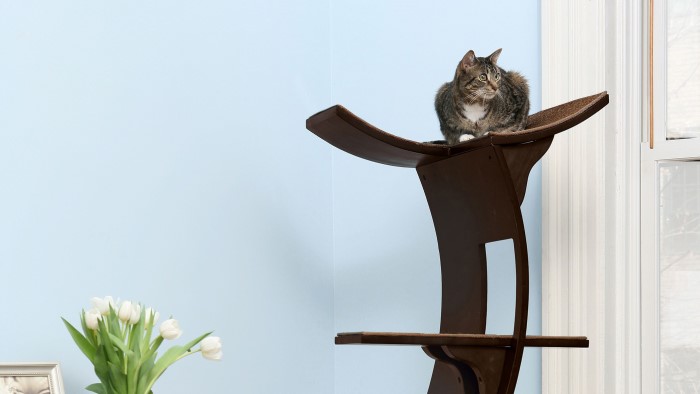Many animals experience a wide range of feelings and emotions, including anxiety. This easily applies to cats as they can express a wide range of anxiety issues. Cats will express themselves differently when feeling anxious, making it hard to figure out the root causes. The best course of action is to learn more about cat anxiety, the symptoms, and how you can help. Read on for tips on how to calm your anxious cat from The Refined Feline.
Defining Cat Anxiety
Your cat will express their anxiety in a number of ways, some more subtle than others. PetMD lists anxiety into three categories: phobia, fear, and basic anxiety. A phobia is a persistent fear of a specific event or stimulus. So if your cat is scared of a thunderstorm, they are experiencing a phobia. When a cat is fearful or afraid, they think an object, a person, or a situation is a threat. This fear is instinctual to them and the situation they’re focusing on could pose no threat to them at all.
When a cat is experiencing basic anxiety, they are anticipating impending dangers that may or may not exist. The symptoms of basic anxiety in your cat will be similar to those of fear. Just like humans, cat anxiety is constant for them, while fear or phobia may be a short-term issue. Cat anxiety develops in mature cats ranging from 12-36 months of age.
Symptoms will appear as very obvious or very subtle. More obvious symptoms include compulsive pacing, hiding, diarrhea, urinating or defecating outside of the litter box, and increased vocalization. Increased vomiting is another sign, as well as your cat eating too quickly or barely touching their food. Increased aggression is another obvious symptom if they’re feeling threatened. Your cat may instead be more docile and submissive, even cowering.
Cats will overgroom if feeling afraid or tense, with visible hair loss usually on their belly or feet. More subtle symptoms of anxiety can include avoiding eye contact or dilated pupils. Your cat may tuck their tail against its body, and move its head away from any attention. Your cat can be anxious or fearful if they are continually staring at a person or object, especially when close. If you notice your cat trying to seem invisible to people, this is another sign of fear.
Calming An Anxious Cat
First things first, take your cat to the vet for a checkup to rule out anything medical. There are a host of illnesses or diseases that could make your cat experience changes in behavior. If your vet determines there is no medical reason for your cat’s anxiety, then move on to the next step.
1. Give Your Cat Extra Play Time
Just like dogs, cats can form separation anxiety while home alone. If you frequently come home to find your feline destroying items or vocalizing, this is a tell-tale sign. Keep your feline focused and entertained by providing the right amount of enrichment. It’s important to play with your cat multiple times a day, whether they’re stressed or not.
Incorporate at least an hour of playtime throughout the day to keep them calm and tuckered out. Enrichment comes in many forms, from utilizing food puzzles for treats to catnip and paper bags. Ensuring they have a high enough area to climb is equally important.
A large cat tower that gives cats places to play, climb, nap, and perch is the ideal option. The Refined Feline designs modern cat towers, cat shelves, litter box furniture, and more that are easy to clean and will look great in your home.
2. Creating Safe Spaces
It may seem tricky figuring out why your cat is so nervous as anything can be the root of the problem. Cats will cope by instinctively seeking out hiding locations, whether high up or down low. Without an adequate place to hide, your cat will experience even more anxiety. It’s vital to have a specific spot of your home dedicated to your cat for a sense of security. This area could be a corner, a cat tree, or an entire room where they feel secure and safe.
A party, a baby, or a new dog can all be fearful experiences for your cat. Having a high-up spot or leaving the area to someplace quieter will help alleviate your cat’s anxiety. A bedroom with a cat tree is perfect as it offers a high and low spot for them to hide. Having this area will work for fearful events too, like vacuums, fireworks, or thunderstorms, curbing some of their anxiety.
3. Sticking To A Routine
It may come as a shock, but cats thrive on routine, and who could blame them? Knowing when it’s mealtime and when you get home eases any anxiety they may feel otherwise. If you frequently stay late at work, travel extensively, or have other routine imbalances, this may stress out your cat. Whether it’s your absence or they have to deal with strangers giving them dinner, all these situations can create stress.
Establishing a routine is greatly beneficial to your cat and their stress levels. When they know what to expect on a daily basis, they will feel calmer and less anxious. Sticking to a routine can be hard to maintain in your household, however. If you can’t commit to a full-blown routine, try to incorporate the new schedule slowly. This can give your cat time to adjust to the new schedule, even if it still is a little hectic. Easing your feline into a chaotic routine is better than an overnight change in the long run.
Follow These Tips On How To Calm Your Anxious Cat
Whichever category of anxiety your cat is going through, there’s a change that can most likely help. By first visiting a veterinarian, you can ensure your cat is healthy. Knowing there are no medical issues with your cat will open up a whole new list of potential issues. But understanding the basics of cat anxiety will help you help your feline feel less anxious!

